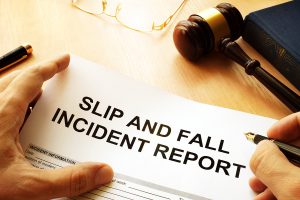Premise Liability for Slip and Fall Cases
 Michael Babboni
Premises Liability
Slip and fall cases typically fall under the umbrella of personal injury law, and these cases state that the owner of a property may be held liable for damages or injuries that occur on their property. While they are considered personal injury cases, they also fall into the category that is better known as premises liability claims.
Michael Babboni
Premises Liability
Slip and fall cases typically fall under the umbrella of personal injury law, and these cases state that the owner of a property may be held liable for damages or injuries that occur on their property. While they are considered personal injury cases, they also fall into the category that is better known as premises liability claims.What is a Premise Liability Claim?
In a premise liability claim, the injuries sustained on the property are usually due to unsafe or defective conditions on someone else’s property. The majority of personal injury and premise liability claims are also based on the negligence of the person who owns the property because they have failed to ensure a safe environment.
In order to win a premises liability claim, then the injured party must be able to prove that the accident was caused due to the owner’s negligent behavior and their failure to use reasonable care when it comes to their property.
It is also important to remember that even if the conditions were seemingly unsafe, it does not necessarily mean it was due to the property owner’s negligence. The owner must have been aware of the conditions prior to the accident, or they should have had previously reasonable knowledge of the conditions to that effect and then failed to take the proper steps to correct the situation.
Types of Premise Liability Cases
A few cases that fall under premise liability include of course slip and fall cases, snow and ice accidents, inadequate maintenance on the property, defective conditions, inadequate security, water leaks, and flooding, among others that may be more specific to the property such as swimming pool or amusement park accidents.
A slip and fall case is one of the more common and more straightforward cases in regard to premise liability. Slip and falls may result from a number of different conditions including but not limited to defective staircases, the accumulation of ice or snow, oily or wet floors on the premises, unsecured rugs and carpets, and loose floorboards or broken sidewalks.
Proving Premise Liability for a Slip and Fall
To prove fault in a slip and fall, you will want to be able to prove that the owner of the property could have done something to prevent the accident from occurring in the first place. To determine fault, several guidelines are used to help.
• The property owner or other reasonable party or employee should have been aware of the conditions of the property and then taken the proper steps to fix these conditions, but failed to do so prior to the accident
• They definitely were aware of the conditions but didn’t care to maintain or fix the property in a reasonable manner
• The property owner or other responsible party caused the dangerous conditions
They will then consider how long the conditions were considered dangerous prior to the accident. They will also look into the daily cleaning and maintenance logs to determine why the problems had not yet been addressed, and if there was a legitimate reason the conditions existed at the time of the accident.
Along with all this information, they will also collect information regarding the person filing the claim including why they were on the premises to begin with, the condition they were in while visiting the premises, and if they exercised reasonable caution to have perhaps lessened or eliminated their chance of the slip and fall actually occurring.
Some slip and fall cases can become a long and complex matter and involves a lot of evidence to prove negligence. Hiring a personal injury attorney may be a good step to take before filing your claim to ensure that you have a case that you can successfully win.
